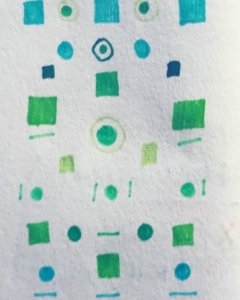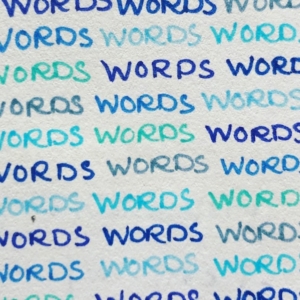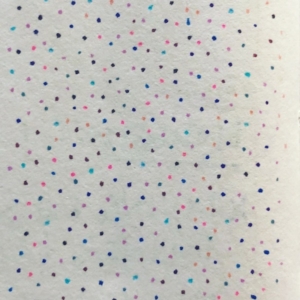Admissions: Part II
 The attic ladder unfolds from the ceiling, groaning as it settles into place. It’s late at night but I smell sunbaked wood, and sawdust and old cardboard boxes—my old cardboard boxes. My parents have been kind enough to store the things I cannot part with but didn’t have space for in my Brooklyn apartment, and later couldn’t afford to move across the country to Los Angeles. I’m not a packrat—I don’t hold onto stuff—but years of notes, journals, papers, plays, and stories do not qualify as stuff. It’s possible that these boxes contain everything I wrote from elementary school on, with the exception of work I lost when my Macintosh Classic died my senior year of college, before backing up hard drives was a common practice.
The attic ladder unfolds from the ceiling, groaning as it settles into place. It’s late at night but I smell sunbaked wood, and sawdust and old cardboard boxes—my old cardboard boxes. My parents have been kind enough to store the things I cannot part with but didn’t have space for in my Brooklyn apartment, and later couldn’t afford to move across the country to Los Angeles. I’m not a packrat—I don’t hold onto stuff—but years of notes, journals, papers, plays, and stories do not qualify as stuff. It’s possible that these boxes contain everything I wrote from elementary school on, with the exception of work I lost when my Macintosh Classic died my senior year of college, before backing up hard drives was a common practice.
As I climb the ladder, my mother hands me a heavy flashlight and asks if I’m okay in my clogs. It’s not the smartest move to wear clogs on a ladder—or in an attic with exposed, 40-year-old bright pink fiberglass insulation on the floor—but I’m already up, shining the light on my dusty boxes, searching for my handwriting—Scripts, Notes, Books, Grad School, College. I’m looking for High School. I find it quickly. We’re an organized bunch, my family. We label things; we keep things in order. I open the box.
* * *
Since writing Admissions: Part 1—an essay about sexual misconduct I experienced during a college interview when I was sixteen—I’ve tried to find out the name of the interviewer by contacting the admissions office, enlisting the help of a family friend who’d been an administrator at the university, and reaching out to women in my high school class who applied when I did. These efforts didn’t yield any significant information. Instead, they left me feeling paranoid.
When I talk to people about the process of trying to get the man’s name, I’m convinced a few of them are thinking that I must be remembering wrong, that I misread the situation, that I’m viewing what happened through a contemporary lens rather than an it-was-a-different-time lens. When people ask what I plan to do with the man’s name, I hear suspicion in the question. I say, “I just want it,” or “I think I deserve to know who he was, don’t you?” “Of course,” they say in a tone I perceive as placating. I come out of these interactions confused about my intentions, and my needs.
I asked the family friend and former administrator to help me communicate with the admissions office, and he did. For a while, he and I had a dialogue. Then, in his last email, I learned that “a lot of records are destroyed after seven years” and that “there don’t seem to be any other records that would help.” This email was carefully worded, perhaps designed to discourage further action while being vague in case the correspondence ended up in the hands of a journalist or a lawyer. The family friend ended with, “take care and be well,” which felt more like, “I’m done helping you.” In an earlier exchange, he’d said he was going to check with the university’s general counsel to see if it was possible to get information about lawsuits or complaints filed against the admissions office at the time. Maybe the general counsel told him he never should have been talking to me in the first place. I didn’t ask.
* * *
 Inside the High School box are carefully labeled folders for every subject I studied. I have notes from calculus, physics, philosophy. I have programs from concerts, newspaper clippings from the local paper, notebooks full of backstories about the characters I played in shows. At the bottom, there is a folder with report cards, recommendations, and acceptance letters from colleges. The rejection and waitlist letters are missing—I must have thrown them out.
Inside the High School box are carefully labeled folders for every subject I studied. I have notes from calculus, physics, philosophy. I have programs from concerts, newspaper clippings from the local paper, notebooks full of backstories about the characters I played in shows. At the bottom, there is a folder with report cards, recommendations, and acceptance letters from colleges. The rejection and waitlist letters are missing—I must have thrown them out.
I’m hoping to find my Day-Timer from senior year. Instead I find a journal. It starts in September, and it’s all about the horrible breakup I suffered over the summer, and the boy I’d liked in a secret for a few years who asked me out after the breakup. I can barely make myself read these entries, not just because the writing is awful but because I can tell that, at the time, I thought it was great. I have affection for this version of me though I don’t recognize her as myself. However, I’m impressed by her output. Pages and pages and pages… until the entries stop at the end of October. They pick up again at the beginning of December. My interview was in November.
* * *
In the days before the first part of this story was posted, I told my parents about what happened. I was dreading this conversation, worrying that they would be upset—or perhaps even angry—about my not coming to them at the time. So I planned to lay some conversational ground work and ease us all into it. On the phone with my mother, I told her I was writing a piece about applying to college. I asked her to think about whether there was anything in particular she remembered about my interview for the university. There was a pause, then she said, “Well, I remember what you told me when you came home from your interview.”
I laughed, startling myself. It was instant, uncontrollable. “I told you?”
“You told me he hit on you. We had a long conversation about it. You were furious.”
What a thing to hear, when all I’d been able to remember about my feelings that day was fear and shame. It made me giddy to think that sixteen-year-old me was furious by the time I got home. I wish I could remember that drive, the transition from fear to fury. I wish I could see my face transform as the new me was born, the one who would insist on seeing only female doctors, and who would imagine the violence I’d perpetrate against anyone who touched me without my permission.
As we talked more, I realized I’d only told my mother half the story—I told her what the man said, not what he did. Had I told her the whole story, things might have gone a different way—we might have reported him. But instead, she and I talked about protecting my reputation and keeping my options open for college. Neither of us told my father. All these years later, she, like me, questions our decisions. In this cultural Klieg-light moment, when girls and women no longer hide their stories out of fear, shame, and deference to the established social order, my mother and I wonder what might have happened had we spoken up, and try not to think about the obligation we had to do so.
* * *
 As I close the box, I’m struck by a concern that is out of character. I worry I’ve disturbed the spirits of my past, tricking my notes, stories, scripts, and books into thinking that they are finally leaving the attic to take up their rightful place with me. It’s not time for that yet—I still don’t know where my rightful place is. But I’m grateful for every piece of paper I saved, each one reflecting who I was as a child, as a teenager. These are the records that tell me who I am. These are the records that matter.
As I close the box, I’m struck by a concern that is out of character. I worry I’ve disturbed the spirits of my past, tricking my notes, stories, scripts, and books into thinking that they are finally leaving the attic to take up their rightful place with me. It’s not time for that yet—I still don’t know where my rightful place is. But I’m grateful for every piece of paper I saved, each one reflecting who I was as a child, as a teenager. These are the records that tell me who I am. These are the records that matter.
I make my way back down the ladder and, for some reason, try to fold it up quietly. But it will not be silenced, creaking and wailing as I push it back up into the ceiling.
Louise Rozett is a YA author, a playwright, and a screenwriter—the order depends on the day. She’s the author of the Confessions series (Confessions of an Angry Girl, Confessions of an Almost-Girlfriend) published by HarlequinTEEN, and wrote a pilot based on the series which won best half-hour original script at the Austin Film Festival. Her play Break, about the effects of the 9/11 recovery effort on the recovery workers and their families, was a finalist for the Stanley Drama Award and was workshopped at New York Stage & Film. She is a graduate of Vassar College and the MFA acting program at The Theatre School at DePaul University. Visit Louiserozett.com for more.
Photo credit: Ericka Kreutz





